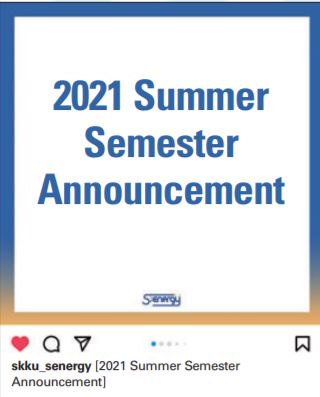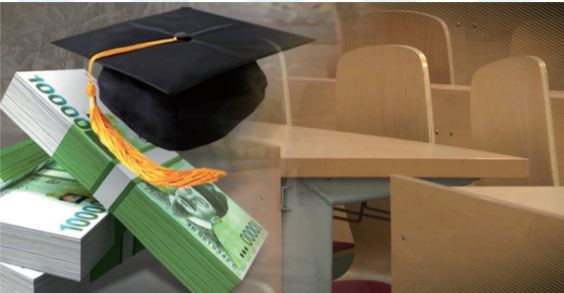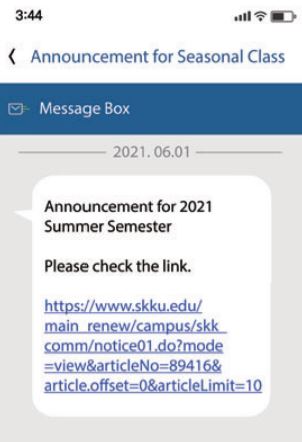On vacation after a busy semester, each Kingo might have various vacation plans. Among these plans, a seasonal class will be a great activity to supplement the shortcomings of their major or take a liberal art class in a particular field of interest. Although students can complete the graduation requirements or repeat courses during the seasonal semester, the institutional limitations of seasonal classes catch up with students who want to take them. As the Sungkyunkwan University (SKKU)’s 2021 Summer Semester starts on June 7th, the Sungkyun Times (SKT) is going to investigate seasonal classes, problems that might arise from the present seasonal classes, and various solutions to develop these classes further.
What Is a Seasonal Class?
Study During Vacations: Seasonal Classes
Seasonal classes refer to lectures that begin during vacations at a university, providing students with opportunities to earn more credits. There are diverse reasons for taking seasonal classes: for completing graduation credits when graduating students have not yet completed them, for course repetition, or just for trying something different during vacation. The biggest difference between regular semesters and seasonal semesters is that seasonal classes are scheduled for a very short period. In the case of regular semesters, classes run over 15 weeks. On the other hand, seasonal classes have tight schedules because students have to finish lectures, assignments, and exams within almost only three weeks. However, there are many students who prefer seasonal classes as they can prepare for early graduation and employment if they have already filled their graduation credits in advance before becoming seniors.
Seasonal Classes at SKKU
SKKU’s 2021 Summer Semester runs for 15 days from June 7th to 25th, and an enrollment appointment was conducted on May 11th. Seasonal classes are available for both enrolled students and students on a leave of absence. The tuition fee is 91,000 won per credit, and they can take classes of up to six credits each semester but a total of nine credits per year. In principle, seasonal classes shall be held mainly for liberal arts classes, which are suitable for short-term intensive education during the vacation period. However, if it is considered necessary to open after the course demand survey, some major classes may be permitted only if a fulltime professor is in charge. In the 2021 Summer Semester, basic liberal arts education requirements, such as English Writing and Creative Writing, and major courses from the Business School and College of Liberal Arts are open.
Problems Regarding Seasonal Classes
Information Out of Reach for Students
The seasonal semester goes through a similar process to regular semesters. Just like regular semesters, students who are willing to take seasonal classes should register for courses, pay tuition, and even participate in the course demand survey before taking real seasonal classes. However, this information has not been delivered extensively compared to regular semesters, so some students often miss the date. In the case of regular semesters, information such as the date of an opening course, enrollment, or paying tuition is announced in detail on the academic schedule, but for seasonal classes, there is only one piece of information: the course opening date. In the same way, some students were unable to participate in the seasonal class demand survey because the announcement is not properly carried out. Therefore, problems with limited subjects and class cancelation due to lack of students occur every seasonal semester. In the case of the 2021 Summer Semester, the information has only been uploaded to SKKU’s official website and the social networking services (SNS) account of S:Energy, the 53rd Student Council of SKKU. Considering that there are Kingos who do not use SNS or follow S:Energy’s SNS account even if they use SNS, it seems that there needs to be an improvement in successfully providing information to all Kingos.

High Tuition Fees but Insufficient Support
Another issue is that seasonal classes lack financial support for tuition. As the national scholarship can be applied only for regular semesters, seasonal classes which are classified separately from regular semesters are not eligible for the national scholarship. Currently, SKKU only provides tuition reduction benefits to North Korean defectors, certain scholarship students, and a person of national merit, so low-income students are not granted support. The lack of support for low-income students hinders their registration in seasonal classes considering at least 180,000 won is needed to take one course and 364,000 won for two or major courses. If there are students who have to study and make a living at the same time, they may give up their opportunities for education. In addition, a situation in which students, who are financially struggling, are restricted from taking seasonal classes creates another problem. Suppose that there are low-income graduating students who have to take seasonal classes to complete their graduation credits. If these students cannot take seasonal classes, they will have to attend additional semesters and pay about 4 million won for regular semester tuition again. To give all students a fair chance, more financial support needs to be considered for a seasonal semester.

Better Seasonal Classes for Everyone
Increase Accessibility to Information
Instead of letting students find information by themselves, it would be helpful if SKKU uses KINGO-M so that everyone can easily get the information on seasonal classes. KINGO-M is an application that provides essential functions for Kingos, such as a mobile student ID and access to GLS. Through KINGO-M, the Office of Academic Services could send students information related to seasonal classes with the application message. If they attach a link to SKKU’s official website or S:Energy’s SNS account with a brief explanation through KINGO-M messages, all students would be able to get information more easily. Moreover, sending text messages can further allow the widespread dissemination of information. Kingos who do not download KINGO-M application or turn off notifications could also get information through text messages. These possible ways are expected to be efficient as they can increase the accessibility to information with the same content to all Kingos.

Expand Financial Well-Being for Kingos
The scope of tuition reduction benefits should be expanded to allow students, who are not financially sufficient, to take seasonal classes. Given that SKKU’s tuition fees for Korean undergraduates have been frozen for more than 10 years despite the current inflation rate, it is important to find ways to benefit students more without lowering tuition fees. The best way is to expand the grant tuition reductions to low-income students. This is a method of giving different exemption benefits to students who meet certain standards according to their income level. Through this, low-income students will be more likely to participate in seasonal classes. As the number of participants increases, the university will be able to open more diverse courses to satisfy other students. When adjusting the range of this benefit, the standard of the national scholarship may be utilized. The national scholarship selected by the Korea Scholarship Foundation (KSF) divides students from 1st to 10th according to income levels. Following the KSF standard, tuition reduction benefits in seasonal classes need to be expanded: support 100% scholarships for 1st to 3rd students 70% scholarships for 4th and 5th students. This will be very efficient in that it uses existing standards to support students in need and to increase students’ participation in seasonal classes.
Seasonal classes have provided opportunities for modern college students, who are becoming busier and busier, to study a greater variety of subjects in advance. Meanwhile, more and more students regard seasonal classes as an essential ‘second regular semester’ rather than an option, saying that the time spent for the study is also competitive. However, compared to those students’ demands for seasonal classes, there are still some things to be improved. In the direction of future seasonal classes of SKKU, the most important thing would be smooth communication between students and the school. When the school and students understand each other’s positions and make concessions, seasonal classes will be further improved.
